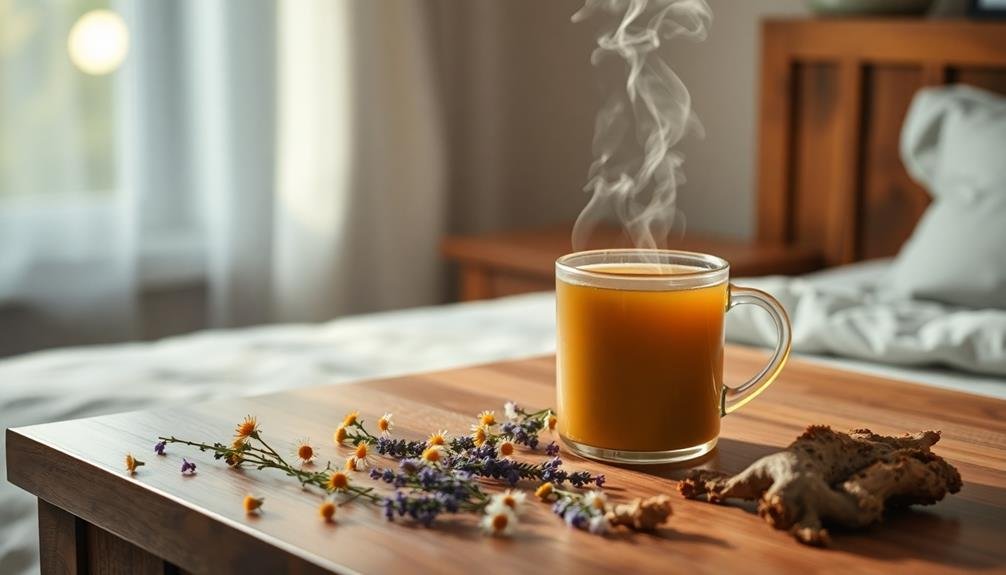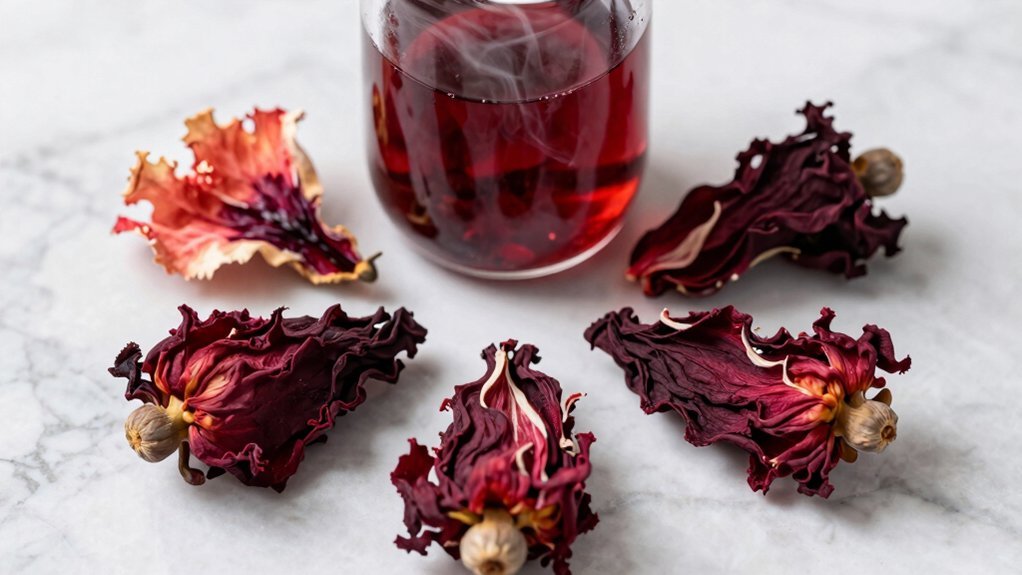For a soothing nighttime sleep tea, you can't go wrong with these five calming herbs. Chamomile, nature's sleep inducer, contains apigenin to reduce anxiety. Lavender interacts with GABA receptors, calming your nervous system. Valerian root, known as "nature's Valium," offers potent sedative properties. Passionflower increases GABA levels, helping with racing thoughts and anxiety-induced insomnia. Lemon balm's active compounds promote relaxation and improve sleep quality. Each herb brings unique benefits to your bedtime routine, from easing you into sleep to enhancing overall rest. Explore these natural remedies to find your perfect blend for a peaceful night's slumber.
Chamomile: Nature's Sleep Inducer

Frequently hailed as nature's sleep inducer, chamomile has been used for centuries to promote relaxation and improve sleep quality. This gentle herb contains apigenin, a flavonoid that binds to specific receptors in your brain, potentially reducing anxiety and initiating sleep.
When you brew chamomile tea, you're extracting its beneficial compounds. The warm, slightly sweet aroma alone can help calm your nerves and prepare your body for rest. As you sip the tea, you'll notice its mild, apple-like flavor and soothing warmth spreading through your body.
To maximize chamomile's sleep-inducing effects, steep one to two teaspoons of dried chamomile flowers in hot water for about 5-10 minutes. You can enhance its flavor by adding a touch of honey or lemon. It's best to drink your chamomile tea about 30 minutes before bedtime to allow its compounds to take effect.
While chamomile is generally safe, it's essential to recognize that some people may be allergic to it, especially if they're sensitive to plants in the daisy family.
If you're pregnant, nursing, or taking medications, consult your healthcare provider before incorporating chamomile into your nightly routine.
Lavender for Relaxation and Rest
Lavender stands out as a powerhouse herb for promoting relaxation and restful sleep. Its calming properties have been recognized for centuries, and modern research supports its efficacy. When you add lavender to your nighttime tea, you're tapping into a natural remedy that can help ease anxiety and improve sleep quality.
The active compounds in lavender, particularly linalool, interact with your brain's GABA receptors, which help calm your nervous system. This interaction can lead to reduced stress levels and a more peaceful state of mind, making it easier for you to drift off to sleep.
You'll find that lavender tea not only tastes pleasant but also fills your senses with its soothing aroma. This aromatic experience can trigger a relaxation response, preparing your body and mind for rest. For best results, steep dried lavender buds in hot water for 5-10 minutes before bedtime.
If you're dealing with insomnia or sleep disturbances, lavender can be a gentle yet effective solution. It's safe for most people and doesn't carry the risk of dependency associated with some sleep medications.
Incorporating lavender into your nightly routine can help establish a consistent sleep pattern, leading to more restful nights and energized mornings.
Valerian Root's Sedative Properties

When you're seeking a powerful natural sleep aid, valerian root should be at the top of your list. This herb has been used for centuries to promote relaxation and improve sleep quality.
Valerian root contains compounds that interact with gamma-aminobutyric acid (GABA) receptors in your brain, helping to calm your nervous system and reduce anxiety.
You'll find that valerian root can considerably decrease the time it takes to fall asleep and improve overall sleep quality. It's particularly effective for those who struggle with insomnia or restlessness at night.
The sedative properties of valerian root are so potent that it's often referred to as "nature's Valium."
To incorporate valerian root into your nighttime tea, steep 2-3 grams of the dried root in hot water for 10-15 minutes. You can also find pre-packaged valerian root tea bags for convenience.
It's best to consume valerian root tea about an hour before bedtime to allow its effects to take hold.
Keep in mind that while valerian root is generally safe, it may cause mild side effects like headaches or dizziness in some people.
As with any herbal supplement, consult your healthcare provider before regular use.
Passionflower: Anxiety-Reducing Herb
Another powerful herb for promoting sleep and reducing anxiety is passionflower. This beautiful climbing vine has been used for centuries in traditional medicine to calm nerves and improve sleep quality. Passionflower works by increasing levels of gamma-aminobutyric acid (GABA) in your brain, which helps reduce anxiety and promote relaxation.
When you're feeling stressed or having trouble sleeping, brewing a cup of passionflower tea can help soothe your mind and prepare your body for rest. It's particularly effective for those who experience racing thoughts or anxiety-induced insomnia. Studies have shown that passionflower can improve sleep quality and reduce the time it takes to fall asleep.
Here's a quick guide to using passionflower for better sleep:
| Form | Dosage | Timing |
|---|---|---|
| Tea | 1 tsp dried herb | 30-60 min before bed |
| Tincture | 10-30 drops | 30 min before bed |
| Capsules | 500-1000mg | 1 hour before bed |
| Essential oil | 2-3 drops in diffuser | Throughout the evening |
Remember to consult with your healthcare provider before adding passionflower to your routine, especially if you're taking medications or have existing health conditions.
Lemon Balm's Calming Effects

Lemon balm, a fragrant herb from the mint family, offers potent calming effects that can help you unwind and prepare for sleep. Its active compounds, including rosmarinic acid and citronellal, work together to reduce anxiety and promote relaxation.
When you're feeling stressed or restless, brewing a cup of lemon balm tea can provide quick relief and set the stage for a peaceful night's rest.
To make the most of lemon balm's soothing properties, try these simple steps:
- Steep 1-2 teaspoons of dried lemon balm leaves in hot water for 5-10 minutes
- Add a touch of honey or lemon for flavor, if desired
- Sip slowly about 30 minutes before bedtime
- Practice deep breathing while enjoying your tea to enhance its calming effects
Research has shown that lemon balm can improve sleep quality and duration, particularly for those with mild sleep disturbances.
It's also been found to boost cognitive function and mood, making it an excellent choice for your nighttime routine. You'll likely notice reduced anxiety, improved focus, and a general sense of well-being after incorporating lemon balm tea into your evening ritual.
Frequently Asked Questions
Can Pregnant Women Safely Consume Sleep-Inducing Herbal Teas?
You should be cautious with sleep-inducing herbal teas during pregnancy. Some herbs can be harmful to your baby. Always consult your doctor before consuming any herbal teas while pregnant. They'll guide you on safe options.
How Long Before Bedtime Should I Drink Sleep Tea for Optimal Effects?
You'll want to drink your sleep tea about 30-60 minutes before bedtime. This gives your body time to absorb the calming compounds and start feeling drowsy. Don't drink it too late, or you'll need bathroom trips.
Are There Any Potential Side Effects of Drinking Herbal Sleep Teas Regularly?
While generally safe, you might experience mild side effects from regular sleep tea consumption. These can include drowsiness, headaches, or digestive issues. Some herbs may interact with medications. It's best to consult your doctor for personalized advice.
Can I Mix Different Calming Herbs to Create My Own Sleep Tea Blend?
Yes, you can mix different calming herbs to create your own sleep tea blend. It's a great way to customize your nighttime routine. Just be sure to research each herb's properties and potential interactions before combining them.
Do Herbal Sleep Teas Interact With Prescription Sleep Medications or Other Drugs?
Yes, herbal sleep teas can interact with prescription sleep medications and other drugs. You shouldn't mix them without consulting your doctor first. Some herbs may enhance or interfere with your medications, potentially causing unexpected side effects or reduced effectiveness.
In Summary
You've now discovered five powerful herbs to enhance your nightly sleep routine. By incorporating these calming botanicals into your bedtime tea, you'll be setting yourself up for a more restful night. Remember, consistency is key. Try different combinations to find what works best for you. Don't hesitate to consult with a healthcare professional if you have any concerns. Sweet dreams await as you sip your way to better sleep with these natural remedies.





Leave a Reply